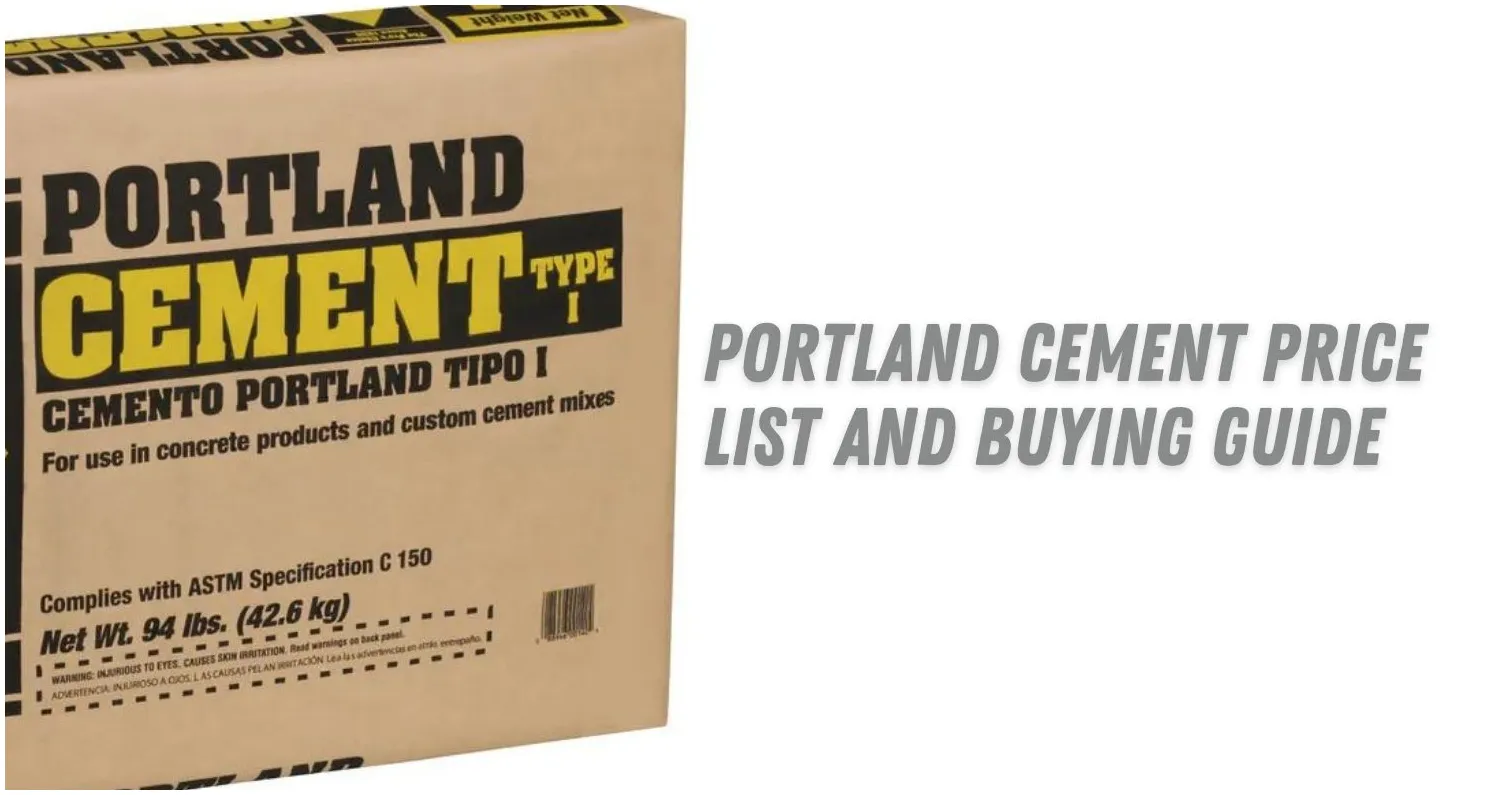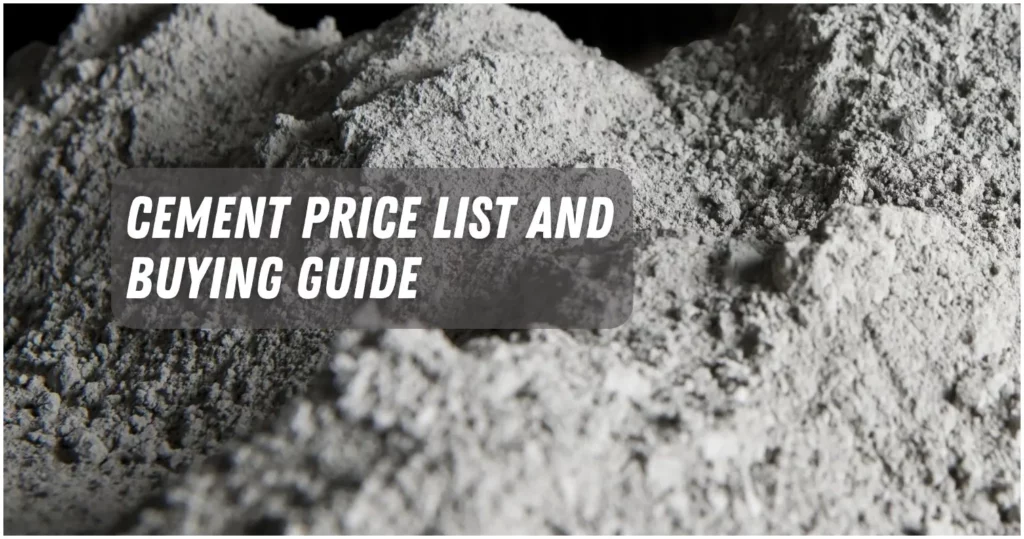Portland cement is a type of hydraulic cement that is often used in building and its price vary from ₱122 to ₱550 based on its type and where it comes from.
In this piece, we’ll talk about the different kinds of type and what they’re used for, so you can make an informed decision.
By the end of the article, you’ll know everything there is to know about Portland cement price range, type and how to choose the best choice for your building needs.
What Is Portland Cement Price?

The price of Portland cement varies on the country and the type.
It is a hydraulic cement made by grinding it clinker, and it often contains calcium sulfate.
In a rolling kiln, gypsum is heated with limestone, clay, and other silica materials to make a fine powder.
There are different kinds of this type of cement, and each has its own building uses.
For example, in the Philippines, the price of this general-purpose cement depends on things like its range and where it is.
Types of Portland Cement
There are different kinds of general-purpose cement, and each one has its own qualities and uses. In the US, there are five common types, which are:
Type I (Ordinary Portland Cement)

This is the normal cement that is used for most building projects.
It can be used for a wide range of building parts and structures.
Type II (Modified Portland Cement)

The cement in Type II has been changed to make it last longer.
It is used to build things that will be exposed to water, salt, or heat.
Type III (High Early Strength)

This type of cement has a high strength right away, which makes it great for projects that need to get strong quickly.
It is often used to make precast concrete and in cases where the formwork needs to be taken down quickly.
Type IV (Low Heat Portland Cement)

Type IV cement doesn’t produce as much heat when it hardens, so it can be used for big concrete buildings.
It helps to reduce the chance of cracking from heat.
Type V (Sulfate Resistant Portland Cement)

Type V cement is made to keep sulfate attacks from doing damage.
It is used in buildings that are subject to a lot of sulfate or alkali compounds.
There are also different kinds of this general-purpose cement like:
- Colored Cement that has been mixed with pigment to make it look nicer and aesthetic.
- Air-entraining cements use an organic agent to add tiny air bubbles, which makes the cement more resistant to freezing and thawing.
- Low-alkali cements are used when the alkalis in the cement react with some of the rocks and cause the cement to expand.
- Masonry cement is a mixture of general-purpose cement, filler (like limestone), and chemicals that is mostly used to make mortar.
- Waterproof and hydrophobic cements: Use agents that prevent water to stop moisture from getting in.
- Oil-well cement is a special type of cement used in the oil and gas business for high-temperature and high-pressure situations.
It’s important to know that Portland is not a brand name. Instead, it’s a type of cement that is made by many different companies.
Portland Cement Price List
There are different prices for Portland cement, but most of them are not very different. It might make it hard for people to decide which cement to buy.
Here is a list of the different sizes and brands of cement and how much they cost per bag.
| Brand | Size | Price |
|---|---|---|
| Rizal structural masonry cement | 1 kg | ₱122 |
| Eagle Portland cement | 1 kg | ₱130 |
| Chichibu White Portland cement | 1 kg | ₱180 |
| Generic White Portland cement | 1 kg | ₱187 |
| Portland pozzoloana cement | 40 kg | ₱235 |
| Republic Portland cement | 40 kg | ₱350 |
| Holcim Portland cement | 40 kg | ₱550 |
The price of Portland cement depends on a number of things, such as the type, size, and the brand.
No matter how much you spend on cement, if you get the right kind, it will be worth it.
So, to make the best choice, you need to know what kind of building to build and where it should go.
Portland Cement Uses

Most of the time, Portland cement is used as the main ingredient in making concrete. It is also needed to make mortars, stucco, and some kinds of grout.
When Portland cement is mixed with rock, sand, and water, it makes concrete, which can be shaped into different shapes and used as a building material. Concrete is used in a lot of public buildings, including walls, roads, beams, and dams.
Portland cement hardens and sets up, which makes concrete strong and long-lasting over time. It takes about 45 minutes to set up at first, and about 12 hours to set up completely.
With that characteristic it often used in bridges, walls, floors, pavements, sidewalks, pipes, houses, and many other construction projects.
In the building business, Portland cement is also used in mortars, plasters, screeds, and grouts for different purposes.
Advantages and Disadvantages

It’s important to think about pros and cons when using the right type of cement for a particular building project like this following
The Pros of Portland cement
- Great strength against cracking and shrinking.
- Faster initial setting time, so supports can be taken away from building projects sooner.
- Shorter cure time means less money spent on curing.
- Widely available and used often in the building business.
The Cons about Portland cement
- It has a high heat of hydration, which makes it not good for mass concrete.
- Less durable than PPC (Portland Pozzolana Cement) and other types of cement.
- Concrete made with Portland cement doesn’t stick together as well, which makes it harder to move.
- Because it is less fine and lets more air through, it doesn’t last as long.
- Costs more than other types of cement.
- Portland cement can irritate the eyes, nose, and skin. Long-term contact can cause breathing problems and other health problems.
How to Choose Portland Cement

To choose the right Portland cement, consider the following:
1. Purpose
Determine how the cement will be used, such as in general building, mass concreting, or specialized projects.
2. Strength Requirements
Figure out how strong the building or project needs to be, whether it needs to get stronger quickly or last for a long time.
3. Environment
Think about whether the cement will be exposed to acids, sulfates, or high temperatures. Some types of Portland cement are more resistant to these conditions than others.
4. Type of Cement
Learn about the different types of Portland cement, such as Type I, Type II, Type III, Type IV, and Type V. Each type is made for a different reason and has its own performance characteristics.
5. Cost
Figure out if the cement is worth the money by looking at things like the original cost, the cost of maintenance over time, and how long it will last.
6. Expert Advice
Talk to engineers, architects, or other construction experts who have experience and know how to choose the right type of cement for your project.
By carefully considering these factors and getting help from experts, you can choose the right Portland cement for your building needs.
FAQ Portland Cement
What is Portland cement used for?
Portland cement is used to make the concrete that is used to build buildings, walls, floors, pavements, and other things.
What’s the difference between Portland and normal cement?
Because it is made without iron or manganese, white Portland cement is gray. The raw products used make a difference.
Why is it called Portland cement?
It got its name because when its product is wet, it looks like a stone from England’s Isle of Portland.
What is Portland cement concrete?
When you mix Portland cement with water, sand, and rock, you get concrete. It gets hard and makes a strong, stable frame.
Is Portland cement waterproof?
No, Portland cement is not waterproof in and of itself. But you can make special cement that won’t get wet by adding things that don’t let water stick to them.
Is Portland cement stronger than concrete?
Cement by itself is not as strong as concrete. Cement is used to hold things together, and when aggregates are added to cement, the concrete gets harder.
Is Portland cement natural?
No, Portland cement is not made from natural materials. Instead, it is made from a variety of limestone, shale, gypsum, and other things.
What are the types of Portland cement?
Portland cement comes in five basic types: regular (Type I), modified (Type II), high-early-strength (Type III), low-heat (Type IV), and sulfate-resistant (Type V).
Is Portland cement the same as masonry cement?
Masonry cement is a mix of Portland cement and other ingredients that is used to build stonework and stucco.
What are the advantages of Portland cement concrete?
Portland cement concrete doesn’t crack or shrink easily, sets up quickly at first, and costs less to cure.
Why is Portland cement strong?
When calcium silicate hydrate crystals form in Portland cement, they make the structure thick and strong.
What is another name for Portland cement?
Type I Portland cement most of the time, is called “general-purpose cement.”
What is the strength of Portland cement?
Normal strength Portland cement concrete has a compression strength between 3000 and 6000 psi.
[ratings]

